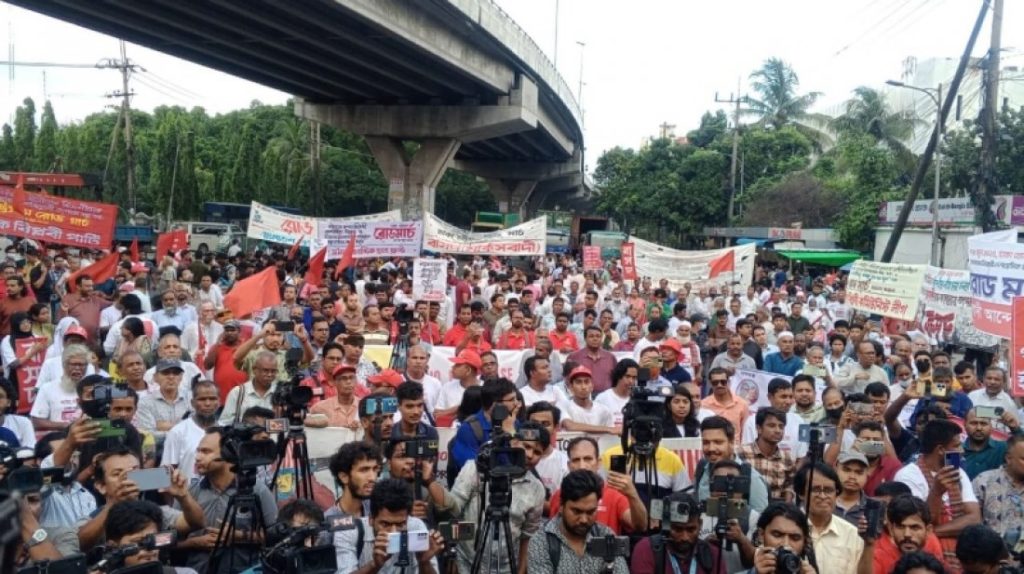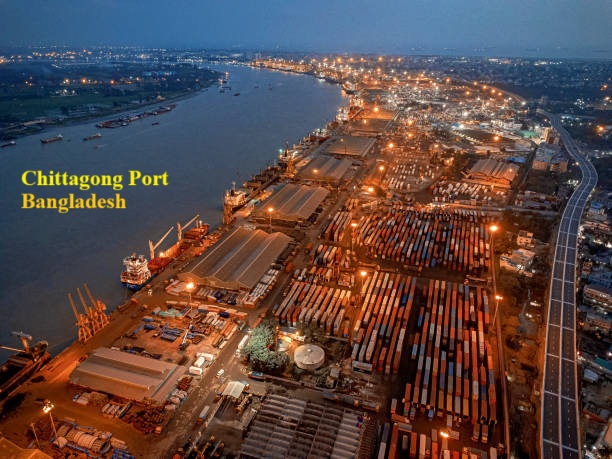The Communist Party of Bangladesh (CPB), led by General Secretary Ruhin Hossain Prince, concluded a two-day road march from Dhaka to Chittagong on Saturday, June 28, with a fiery rally outside the Chittagong Port Building, demanding the immediate cessation of plans to lease the port’s operations to a US-linked company, DP World, and the closure of a proposed humanitarian corridor to Myanmar’s Rakhine state.
The protest, organised under the banner of the “Anti-Imperialist Patriotic People” platform, has ignited a national debate, with Chief Adviser Muhammad Yunus’ resolve to proceed with the lease despite widespread opposition raising alarms over Bangladesh’s sovereignty and security, particularly from regional powers China and India, as well as domestic political parties, security experts, and journalists.
The road march, which began on June 27 from the National Press Club in Dhaka, saw participants holding rallies in Comilla, Feni, Mirsarai, and Sitakunda before converging on Chittagong’s port area around 4:45pm.

Ruhin Hossain Prince, also the Central Coordinator of the Left Alliance, addressed a crowd of supporters, emphasizing the port’s profitability and national significance.
“Chittagong Port is a profitable institution. It should not be leased to foreigners in any way,” he declared.
The CPB leader warned that the interim government’s actions threaten Bangladesh’s sovereignty, stating: “Without a second’s delay, we announced that we will not lease the port. If you do not stop your anti-national, anti-sovereign activities, we will announce a new program of the movement after the People’s Uprising Day on August 5.”
His remarks reflect broader disillusionment with the Yunus administration, which assumed power following the July 2024 uprising that ousted the Awami League. He accused the Awami League of stripping democratic rights and expressed hope that the interim government would deliver justice for the uprising’s casualties and electoral reforms.
EXCLUSIVE: Video shows Yunus is mentally, physically unstable
Sheikh Hasina slams Yunus for economic crisis, lies, mobocracy
St Martin’s Island: Yunus is causing silent famine for dubious project
However, he lamented: “We hoped this government would fulfill that responsibility to the people… It would make visible the work of judging such a big murder. It would do the necessary reforms… And will hold elections to travel on the path of democracy.”
The CPB’s stance has resonated with the public, with Ruhin Hossain Prince noting widespread support along the march route, signaling growing discontent.
The rally featured other leftist leaders, including Bazlur Rashid Firoz of the Bangladesh Communist Movement, Shuvrangshu Chakraborty of the Revolutionary Communist League, Iqbal Kabir Zahid of the Revolutionary Democratic Party, Mosherefa Mishu of the Democratic Revolutionary Party, CPB Chittagong District President Ashok Saha, and BAZD Chittagong Coordinator Al Qaderi Joy.
Their unified opposition centers on the proposed lease of the New Mooring Container Terminal (NCT) to DP World, a Dubai-based firm with alleged ties to the US Navy, and the Rakhine corridor, which critics argue could entangle Bangladesh in geopolitical conflicts.
Yunus’ determination to proceed with the DP World deal, despite the CPB’s protests, has escalated tensions. Sources within the interim government suggest Yunus views the lease as a strategic move to bolster economic ties with the United States, potentially securing international legitimacy for his unelected administration.

However, this decision has drawn sharp criticism. Security experts warn that handing over port operations to a US-linked entity could compromise Bangladesh’s neutrality, especially given Chittagong’s strategic location in the Bay of Bengal.
China, a major investor in Bangladesh’s infrastructure through the Belt and Road Initiative, has expressed concern over potential US military influence, with state media hinting at a review of bilateral projects. India, wary of encirclement by US interests in the region, has privately urged Dhaka to reconsider, fearing destabilization near its northeastern borders.
Domestic political parties have joined the chorus of dissent. The Bangladesh Nationalist Party (BNP), a key opposition force, has condemned the lease as a “sellout of national assets,” with leaders calling for mass rallies to pressure the government.
The Awami League, despite its ouster, has seized the opportunity to criticize Yunus, accusing him of mirroring Hasina’s alleged subservience to foreign powers. Smaller parties, including the Jatiya Party and Jamaat-e-Islami, have echoed these sentiments, framing the move as a threat to sovereignty.
Posts on social media reflect public sentiment, with users decrying the deal as a “new colonial trap” and questioning Yunus’ motives.
Security experts have amplified these concerns. Retired Major General Abdur Rashid, a former military strategist, argued, “Chittagong Port is a lifeline for our economy and security. Allowing a US-linked firm like DP World to manage it could invite foreign military presence, jeopardizing our independence.”
Analysts point to DP World’s contracts with the US military in the Middle East as evidence of potential strategic intent. Journalists, already under pressure with over 260 facing murder charges since August 2024, have been vocal.
Prominent journalist Nobonita Chowdhury recently claimed on a podcast that the lease aligns with a US strategy to use Bangladesh as a proxy in regional conflicts, a view shared by colleagues who face censorship and job losses for such reporting.
The Rakhine corridor proposal has further fueled opposition. Prince warned that it could drag Bangladesh into Myanmar’s civil war, serving US interests to counter China.
This aligns with security expert assessments that the corridor, framed as humanitarian, might facilitate military logistics, drawing ire from India, which fears refugee influxes, and China, which sees it as a US ploy to disrupt its Myanmar investments. The CPB’s threat of escalated protests post-August 5 underscores the growing resistance.
The interim government’s response has been defiant. Yunus, in a recent address, dismissed critics as “misguided patriots,” insisting the DP World deal will modernize the port and attract investment.
However, this stance has been undermined by allegations of opacity, with no public disclosure of the agreement’s terms. The government’s track record—imprisoning over 140,000 Awami League members and amending laws to ban the party—suggests a willingness to suppress dissent, raising questions about its democratic credentials.
The port lease controversy is compounded by broader governance issues. Since August 2024, press freedom has deteriorated, with media offices occupied, accreditations revoked, and journalists like those sacked for questioning Cultural Affairs Adviser Mostofa Sarwar Farooki facing reprisals.
The CPB’s road march, supported by leftist allies, highlights a public demand for accountability. The rally’s success, with thousands joining despite government pressure, signals a potential escalation. Prince’s warning of a “tougher movement” post-August 5 could coincide with commemorations of the uprising, amplifying calls for electoral reforms and justice for the 834 officially recognized deaths—disputed as low by the UN’s 1,400 estimate.
International observers are watching closely. The United States has remained silent, fueling speculation of tacit approval, while China and India’s concerns could strain regional stability. The CPB’s next steps, alongside BNP and Awami League protests, may force Yunus to reconsider, but his resolve suggests a high-stakes standoff. For Bangladesh, the Chittagong Port issue is not just economic but a litmus test of its sovereignty amid global power plays.
As the nation braces for further unrest, the CPB’s rally marks a pivotal moment. With security experts warning of long-term risks, journalists risking their livelihoods to expose the deal, and political parties uniting against it, the pressure on Yunus is mounting. The question remains whether he will heed the public’s voice or double down, potentially endangering Bangladesh’s security in a geopolitically volatile region.